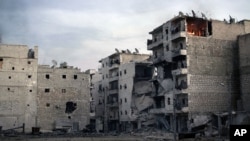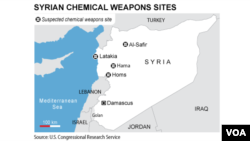U.S. and allied forces would face major challenges if they intervene in Syria's civil unrest to prevent President Bashar al-Assad from using chemical weapons against his own people, according to military experts.
U.S. news media began discussing the possibility of a U.S.-led intervention in Syria after the United States and its partners in the NATO alliance warned that they would not stand by if Assad tried to use chemical munitions in the conflict, or if he lost control of such weapons to certain militant groups in the country.
NBC News reported late Wednesday that "the Syrian military is awaiting final orders to launch chemical weapons against its own people after precursor chemicals for deadly sarin gas were loaded into aerial bombs." Fox News aired a similar report, also citing U.S. official sources.
Syrian officials repeated this week that they would not use chemical weapons against their own people. Assad's deputy foreign minister said Thursday that Western powers were whipping up fears of a chemical weapons threat as a "pretext for intervention." Russian Foreign Minister Sergei Lavrov also expressed doubts about a chemical weapons threat.
If the West does intervene, the options for an international military response are stark, analysts say.
Ground options
Any ground troops sent into Syria to seize chemical weapon sites may have to battle the elite Syrian forces assigned to guard them. Anthony Cordesman, an analyst at the Center for Strategic and International Studies in Washington, said most of those sites are "heavily defended" by Assad loyalists.
Syria's sophisticated air defenses, supplied by Russia, also could pose a threat to an aerial commando strategy.
"There is no way you can move aircraft into the areas without being detected by radar," said Cordesman, a former U.S. Defense and State Department official. "So even special forces raids could have serious problems just in getting to a facility undetected."
Even if allied commandos overcame Syrian resistance, they would likely have a tough time securing Syrian storage sites.
"You (would be) walking into a facility where you don't know the safety rules and the exact storage procedures," Cordesman said. "Dealing with an unknown set of agents is always a matter of risk, even for the United States."
U.S. officials have said they have the ability to monitor the quantities and locations of Syria's chemical weapons with the help of U.S. surveillance assets.
Western security experts say Syria's chemical arsenal includes sarin and VX gas, both lethal nerve agents, and mustard gas, a blistering agent.
Sarin
VX
Mustard Gas
Source: CDC
Syria is thought to store some of its sarin gas in the form of precursor chemicals or components that are less toxic than the final product and require fewer safety measures. VX gas is believed to be stored as a more toxic final compound requiring greater caution.
Cordesman said allied forces could use unmanned aerial vehicles to provide surveillance over chemical sites and alert them to any hazards that they should avoid.
Retaliation risks
Another challenge to any ground operation in Syria is the possibility that Assad's forces would use chemical warheads against the invading forces.
Syria's military is believed to have the capability to deploy those weapons in a variety of ways, including Scud missiles, Russian-made fighter jets and artillery.
Cordesman said allied troops could shield themselves from mustard gas with chemical protection gear and take antidotes in case of exposure to nerve gas. But some antidotes are semi-incapacitating and would make it hard for troops to keep fighting.
That may make an aerial attack a more viable option, Cordesman said.
"You may be much better off using precision-guided missiles to destroy a chemical facility. The (resulting) contamination can be contained and decontaminated," Cordesman said. "And in some ways, the local contamination makes it almost impossible for the Syrians to (later) extract the chemical weapons."
But Cordesman said an air campaign cannot completely prevent chemical contamination from spreading to populated areas and harming the environment.
A first option, Cordesman said, may be for the West to strike Mr. Assad's headquarters and leadership facilities.
"Threatening the Assad government with decapitation may be a more successful way of deterring the problem than trying to solve it all by force," he said.
U.S. news media began discussing the possibility of a U.S.-led intervention in Syria after the United States and its partners in the NATO alliance warned that they would not stand by if Assad tried to use chemical munitions in the conflict, or if he lost control of such weapons to certain militant groups in the country.
NBC News reported late Wednesday that "the Syrian military is awaiting final orders to launch chemical weapons against its own people after precursor chemicals for deadly sarin gas were loaded into aerial bombs." Fox News aired a similar report, also citing U.S. official sources.
Syrian officials repeated this week that they would not use chemical weapons against their own people. Assad's deputy foreign minister said Thursday that Western powers were whipping up fears of a chemical weapons threat as a "pretext for intervention." Russian Foreign Minister Sergei Lavrov also expressed doubts about a chemical weapons threat.
If the West does intervene, the options for an international military response are stark, analysts say.
Ground options
Any ground troops sent into Syria to seize chemical weapon sites may have to battle the elite Syrian forces assigned to guard them. Anthony Cordesman, an analyst at the Center for Strategic and International Studies in Washington, said most of those sites are "heavily defended" by Assad loyalists.
Syria's sophisticated air defenses, supplied by Russia, also could pose a threat to an aerial commando strategy.
"There is no way you can move aircraft into the areas without being detected by radar," said Cordesman, a former U.S. Defense and State Department official. "So even special forces raids could have serious problems just in getting to a facility undetected."
Even if allied commandos overcame Syrian resistance, they would likely have a tough time securing Syrian storage sites.
"You (would be) walking into a facility where you don't know the safety rules and the exact storage procedures," Cordesman said. "Dealing with an unknown set of agents is always a matter of risk, even for the United States."
U.S. officials have said they have the ability to monitor the quantities and locations of Syria's chemical weapons with the help of U.S. surveillance assets.
Western security experts say Syria's chemical arsenal includes sarin and VX gas, both lethal nerve agents, and mustard gas, a blistering agent.
Suspected Syrian Chemical Weapons
Suspected Syrian Chemical WeaponsSarin
- Man-made highly toxic odorless, tasteless, colorless nerve agent
- Possibly used during Iraq-Iran war
- Exposure can be by inhalation, ingestion and skin absorption; people can recover with treatment form mild or moderate exposure
VX
- Odorless, tasteless man-made nerve agent; most potent of all nerve agents
- Slow to evaporate, can last for days on objects
- Exposure can be through skin contact or inhalation; people can recover with treatment for mild or moderate exposure
Mustard Gas
- Chemical warfare agent that causes skin blisters and mucous membranes
- Sometimes odorless, sometimes smells like garlic, onions or mustard
- Exposure can be by inhalation, ingestion or skin contact
- Vapor released in the air can be carried long distances; exposure not usually fatal
Source: CDC
Cordesman said allied forces could use unmanned aerial vehicles to provide surveillance over chemical sites and alert them to any hazards that they should avoid.
Retaliation risks
Another challenge to any ground operation in Syria is the possibility that Assad's forces would use chemical warheads against the invading forces.
Syria's military is believed to have the capability to deploy those weapons in a variety of ways, including Scud missiles, Russian-made fighter jets and artillery.
Cordesman said allied troops could shield themselves from mustard gas with chemical protection gear and take antidotes in case of exposure to nerve gas. But some antidotes are semi-incapacitating and would make it hard for troops to keep fighting.
That may make an aerial attack a more viable option, Cordesman said.
"You may be much better off using precision-guided missiles to destroy a chemical facility. The (resulting) contamination can be contained and decontaminated," Cordesman said. "And in some ways, the local contamination makes it almost impossible for the Syrians to (later) extract the chemical weapons."
But Cordesman said an air campaign cannot completely prevent chemical contamination from spreading to populated areas and harming the environment.
A first option, Cordesman said, may be for the West to strike Mr. Assad's headquarters and leadership facilities.
"Threatening the Assad government with decapitation may be a more successful way of deterring the problem than trying to solve it all by force," he said.





